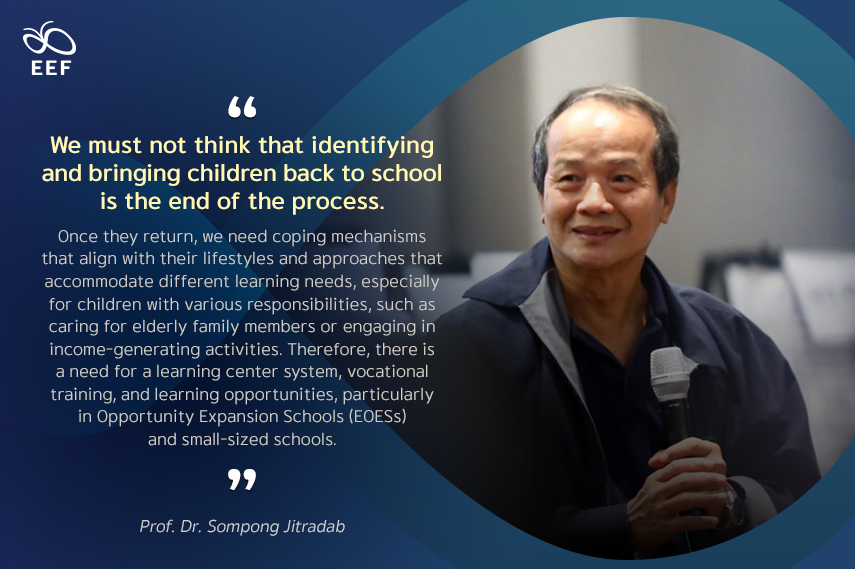
Prof. Dr. Sompong Jitradab, a member of the EEF Executive Committee, explained that the ‘1 School 3 Models’ educational management approach is legally recognized under the Constitution of the Kingdom of Thailand B.E. 2560 (2017) and Article 15 of the National Education Act B.E. 2542 (1999). Article 15 allows schools to provide a Formal Education system, a Non-Formal Education system tailored to the needs of specific learner groups, and an Informal Education system based on student capacity and preference. Schools can provide any of these systems or all three, allowing students to transfer accumulated learning outcomes between the same or different systems and schools. This includes learning from non-formal education, informal education, vocational training, or work experience. Moreover, Article 6 emphasizes that educational management aims to develop individuals into well-rounded humans who can happily coexist in society.

Prof. Dr. Jitradab praised the government and the Ministry of Education for their policies supporting the ‘1 School 3 Models’ educational management approach. He highlighted that these policies help instill confidence in teachers and schools to work effectively with children under the ‘Thailand Zero Dropout’ initiative, which aims to reduce the number of children dropping out of the education system to zero, as announced by the Prime Minister.
“The significance of these two articles in the National Education Act lies in their foundational role in establishing a new education system where every child is not confined to a single standard or system. They highlight the true essence of the teaching profession, which involves not only imparting knowledge but also providing educational opportunities based on students’ rights, taking into consideration each student’s circumstances, needs, and interests, ultimately designing learning methods tailored to each individual to develop their potential fully.”
“This initiative represents an educational reform effort led by the Ministry of Education and its personnel, aiming to create more diverse structures and standards, which has already been demonstrated through prototype schools. This meeting marks the beginning of a significant advancement for Thai education ahead of the new academic year.”

Prof. Dr. Jitradab highlighted data on children dropping out of the education system collected through a survey by the Equitable Education Fund in collaboration with the Ministry of Education, the Ministry of Interior, and the Ministry of Digital Economy and Society. The survey identified 1,025,514 children aged 3-18 who are not listed in the education system. Dr. Jitradab emphasized the importance of flexible educational opportunities as a crucial tool for reintegrating these children into the education system.
“We must not think that identifying and bringing children back to school is the end of the process. Once they return, we need coping mechanisms that align with their lifestyles and approaches that accommodate different learning needs, especially for children with various responsibilities, such as caring for elderly family members or engaging in income-generating activities. Therefore, there is a need for a learning center system, vocational training, and learning opportunities, particularly in Opportunity Expansion Schools (EOESs) and small-sized schools.”

Prof. Dr. Jitradab emphasized that the essence of this meeting lies in the collective commitment of every school to prioritize the curriculum as the cornerstone and then extend their thinking beyond conventional boundaries. By collaborating to integrate diverse subject matter into daily routines or student responsibilities, schools can effectively address the needs of every child, navigate various risks, and guide them through life’s challenges.
“Let’s not overlook the fact that when a child drops out of school, it’s akin to them being drawn into a societal predicament, and within just three months, their lives can enter a state of uncertainty. However, an initiative conducted by the EEF with youth in correctional facilities has demonstrated that by implementing diverse and engaging educational programs, education can fulfill its role as a tool for rehabilitation and empowerment. This approach enables children to reclaim their sense of identity, find acceptance, and steer clear of harmful cycles, guiding them back onto a positive path. This initiative is a testament to the potential impact of integrating such methods into mainstream schooling, which is legally permissible. By doing so, we have the opportunity to significantly mitigate issues such as juvenile delinquency, mental health challenges, substance abuse, and other societal problems while also reducing the number of at-risk youth.”
” Another critical aspect to consider in this endeavor is the teachers’ pivotal role in shaping each child’s lives. They serve as facilitators of opportunities, gateways to resources, and sources of inspiration for children to recognize the significance of education. As we prepare for the upcoming term, I encourage teachers to delve into their students’ families’ lives, gaining insights into their realities. By identifying any obstacles that may contribute to frequent absences or engagement in risky behaviors, we can better tailor our support and assistance to meet their needs effectively. Furthermore, fostering open communication with parents is essential for cultivating positive attitudes towards their children’s education.”

